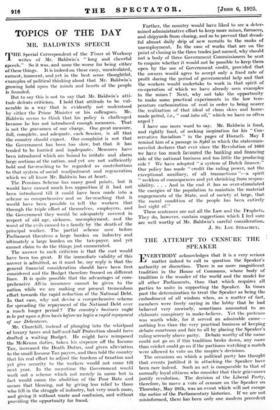TOPICS OF THE DAY
MR. BALDWIN'S SPEECH
THE Special Correspondent of the Times at Worksop writes of Mr. Baldwin's " long and cheerful speech." So it was, and none the worse for being either of these things. It is indeed on these easy, uncaleulated, earnest, innocent, and yet in the best sense thoughtful, examples of political thinking aloud that Mr. Baldwin's growing hold upon the minds and hearts of the people is founded.
But to say this is not to say that Mr. Baldwin's atti- tude defeats criticism. I hold that attitude to be vul- nerable in a way that is evidently not understood by either the Prime Minister or his colleagues. Mr. Baldwin seems to think that his policy is challenged because he has not introduced enough measures. That is not the gravamen of our charge. One great measure, full, complete, and adequate, each Session, is all that the country should expect. Our complaint is not that the Government has been too slow, but that it has tended to be hurried and inadequate. Measures have been introduced which are boUnd to irritate and alarm large sections of the nation, and yet are not sufficiently bold and far-reaching to be regarded as contributions to that system of social readjustment and regeneration which we all know Mr. Baldwin has at heart.
The Pensions Scheme has many good points, but it would have caused much less opposition if it had not been introduced till it could have been made into a scheme so comprehensive and so far-reaching that it would have been possible to tell the workers that through the triple effort of themselves, employers, and the Government they would be adequately covered in respect of old age, sickness, unemployment, and the worst of the evils caused to a family by the death of the principal worker. The partial scheme now before Parliament threatens a large burden on industry and ultimately a large burden on the tax-payer, and yet cannot claim to do the things just enumerated.
The answer to such criticism is that the cost would have been too great. If the immediate validity of this answer is admitted, as it must be, my reply is that the general financial consideration should have been first considered and the Budget therefore framed on different lines. It is quite possible that the advantages of com- prehensive All-in insurance cannot be given to the nation while we are making our present tremendous effort towards the rapid reduction of the National Debt. In that case, why not devise a comprehensive scheme for spreading the repayment of the National Debt over a much longer period ? The country's business ought to be put upon a firm basis before we begin a rapid repayment of our Debentures.
Mr. Churchill, instead of plunging into the whirlpool of luxury taxes and half-and-half Protection should have drafted a waiting Budget. He might have reimposed the McKenna duties, taken his sixpence off the Income Tax, increased the Death Duties, and given alleviation to the small Income Tax payers, and then told the country that his real effort to adjust the burdens of taxation and yet give security to the workers would not come till next year. In the meantime the Government would work out a scheme which not merely in name but in fact would cause the abolition of the Poor Rate and secure that blessing, not by giving less relief to those who fell in the struggle of industry, but very much more, and giving it without waste and confusion, and without providing the opportunity for fraud. Further, the country would have liked to see a deter- mined administrative effort to keep more mines, furnaces, and shipyards from closing, and so to prevent that dread- ful almost daily drip of new recruits to the ranks of unemployment. In the case of works that are on the point of closing in the three trades just named, why should not a body of three Government Commissioners be sent to enquire whether it would not be possible to keep them open by the use of Government credit, provided that the owners would agree to accept only a fixed rate of profit during the period of governmental help and that the workers would undertake to work in that spirit of co-operation of which we have already seen examples in the mines ? Next, why not take the opportunity to make some practical experiments in the low tem- perature carbonization of coal in order to bring nearer the realization of that ideal of clean skies and home- made petrol, i.e., " coal into oil," which we have so often urged ?
I have one more word to say. Mr. Baldwin is fond, and rightly fond, of seeking inspiration for his " Con- servative Socialism " in the pages of Disraeli. May I remind him of a passage in Sybil in which the statesman- novelist declares that ever since the Revolution of 1688 we have too much favoured the banking and financing side of the national business and too little the producing side ? We have adopted " a system of Dutch finance." Our policy has made " credit the ruling power, not the exceptional auxiliary, of all transactions "—a spirit " reckless of consequences and yet shrinking from respon- sibility. . . . And in the end it has so over-stimulated the energies of the population to maintain the material engagements of the State, and of society at large, that the moral condition of the people has been entirely lost sight of."
These sentences are not all the Law and the Prophets. They do, however, contain suggestions which I feel sure are well worthy of Mr. Baldwin's careful consideration. J. ST. LOE STRACHEY.














































 Previous page
Previous page